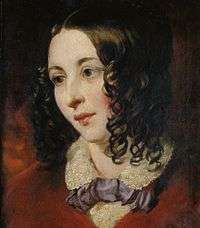Eliza Cook
| Eliza Cook | |
|---|---|
 Portrait by William Etty, c.1845 | |
| Born |
24 December 1818 London Road, Southwark, England |
| Died |
23 September 1889 (aged 70) Wimbledon, England |
| Nationality | English |
| Period | 1830s–1880s |
Eliza Cook (24 December 1818 – 23 September 1889) was an English author and poet associated with the Chartist movement. She was a proponent of political freedom for women, and believed in the ideology of self-improvement through education, something she called "levelling up." This made her hugely popular with the working class public in both England and America.
Childhood
Eliza Cook was the youngest of the eleven children of a brazier (a brass-worker) living in London Road, Southwark, where she was born. When she was about nine years old her father retired from business, and the family went to live at a small farm in St. Leonard's Forest, near Horsham. Her mother encouraged Eliza's fondness for imaginative literature, but the child was almost entirely self-educated. She began to write verses before she was fifteen ; indeed, some of her most popular poems, such as 'I'm afloat' and the 'Star of Glengarry,' were composed in her girlhood. [1]
Career
Her first volume, Lays of a Wild Harp, appeared in 1835, when she was only seventeen. Encouraged by its favourable reception, she began to send verses anonymously to the Weekly Dispatch, the Metropolitan Magazine, the New Monthly Magazine, and The Literary Gazette;[1] William Jerdan sang her praises in the last of these. After a time she confined herself to the radical Weekly Dispatch, where her first contribution had appeared under the signature 'C.' on 27 Nov 1836,[1] and she became a staple of its pages for the next ten years. Its editor was William Johnson Fox and its owner was James Harmer, a London alderman.[2] She lived for a time at Harmer's residence, Ingress Abbey, in Greenhithe, Kent,[3] and wrote certain of her works there.[4]
Her poem The Old Armchair (1838) made hers a household name for a generation, both in England and the United States. In that year, she published Melaia and other Poems.
Her work for the Dispatch and New Monthly was pirated by George Julian Harney, the Chartist, for the Northern Star. Familiar with the London Chartist movement in its various sects, she followed many of the older radicals in disagreeing with the O'Brienites and O'Connorites in their disregard for the repeal of the Corn Laws. She also preferred the older Radicals' path of Friendly Societies and self-education. From 1849 to 1854 she wrote, edited, and published Eliza Cook's Journal, a weekly periodical she described as one of "utility and amusement." Cook also published Jottings from my Journal (1860), and New Echoes (1864). Her works became a staple of anthologies throughout the century.
Views
Cook was a proponent of political and sexual freedom for women, and believed in the ideology of self-improvement through education, something she called "levelling up." This made her a great favourite with the working-class public.
Later life
She was a close friend and lover of the American actress Charlotte Cushman.[5][6][7]
In 1863 she was given a Civil List pension income of £100 a year.[8]
Works
- The Fair Rose of Killarney – A Ballad – By Miss Eliza Cook – Music by Stephen Glover (New-York Mirror Saturday 29 June 1839 pp 32)
- Her article "People Who Do Not Like Poetry" (May 1849) can be found in the book A Serious Occupation: Literary Criticism by Victorian Women Writers ISBN 1-55111-350-3.
- Poems (1859, poems)
- "The Heart That's True" was set to music in 1857 by Australian composer George Tolhurst [9]
References
- 1 2 3 Norgate 1901.
- ↑ http://www.harmer.org/Alderman_James_Harmer.pdf harmer.org
- ↑ http://www.garyvaughanpostcards.co.uk/ingress_abbey_20.html?frm_data1=32&frm_data1_type=large The Gary Vaughan Collection
- ↑ http://www.britishlistedbuildings.co.uk/en-172722-ingress-abbey-swanscombe-and-greenhithe- British Listed Buildings
- ↑ http://paperspast.natlib.govt.nz/cgi-bin/paperspast?a=d&d=NZH18801015.2.31 Recollections of Eliza Cook
- ↑ William Flesch (2010). The Facts on File Companion to British Poetry: 19th Century(Companion to Literature Series). Infobase Publishing. ISBN 0816058962.
- ↑ Lesbian Histories and Cultures: An Encyclopedia, Volume 1, p 217
- 1 2 Chisholm 1911.
- ↑ Calvert, Samuel, 1828-1913; Williams, W. H. (William H.), active 1857-1874 (1858), Williams's musical annual and Australian sketch book for 1858, W.H. Williams, retrieved 1 August 2018
- Attribution


- Notable Women of our own Times, pp. 138–150, with portrait ;
- Miles's Poets of the Century ; Times, 26 Sep 1889;
- Daily News, 26 and 27 Sep ;
- Illustr. London News, 5 Oct, with portrait ;
- Academy and Athenæum, 28 Sep ;
- Brit. Mus. Cat. ;
- Allibone's Dict. Engl. Lit. vol. i. and Suppl.
External links
| Wikimedia Commons has media related to Eliza Cook. |
| Wikisource has original works written by or about: Eliza Cook |
| Wikiquote has quotations related to: Eliza Cook |
- Works by Eliza Cook at Project Gutenberg
- Works by or about Eliza Cook at Internet Archive
- Works by Eliza Cook at LibriVox (public domain audiobooks)

- IMSLP
- Beeton, Samuel Orchard. The Young Englishwoman. London: Ward, Lock, and Tyler, 1875. (pp. 615–619) googlebooks Retrieved 8 May 2008
- The poetical works of Eliza Cook at
- As we expected, our article on Miss Eliza Cook has drawn upon us the fierce wrath of a fair lady, who has written us a trenchant note, in which she declares that Miss Cook is a great poetess. Now, we by no means wished to convey the idea that ladies cannot write poetry. We believe and know the contrary to be the fact., New York Times, 8 October 1851
- http://www.imagesonline.bl.uk/britishlibrary-store/Components/642/64234_1.jpg%5Bpermanent+dead+link%5D
- Robinson, Solveig C. "Cook, Eliza (1812–1889)". Oxford Dictionary of National Biography (online ed.). Oxford University Press. doi:10.1093/ref:odnb/6135. (Subscription or UK public library membership required.)
